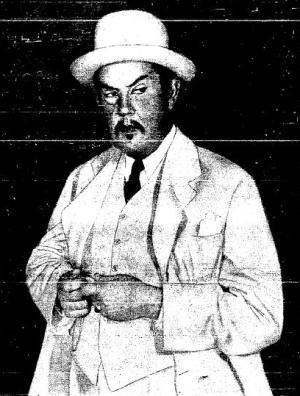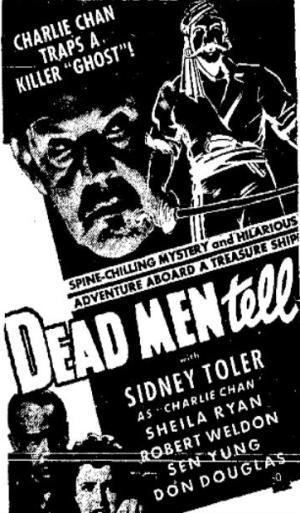By Susan M. Kelly
 There is nothing more difficult in the Hollywood starscape than trying to take over a role made famous by another actor. Many have tried and failed miserably. Yet this was exactly what Sidney Toler did when he stepped into the shoes of Charlie Chan, left vacant by the death of the great Warner Oland. Not only did Toler meet the challenge, he actually surpassed it, becoming both the most prolific and memorable portrayer of Chan.
There is nothing more difficult in the Hollywood starscape than trying to take over a role made famous by another actor. Many have tried and failed miserably. Yet this was exactly what Sidney Toler did when he stepped into the shoes of Charlie Chan, left vacant by the death of the great Warner Oland. Not only did Toler meet the challenge, he actually surpassed it, becoming both the most prolific and memorable portrayer of Chan.
Though he was 65 by the time he took on what would become his most famous role, Sidney Toler’s interest in the theater began many years earlier, during his boyhood in the mid-west. Born in Warrensburg, Missouri on April 28, 1874, Toler first took to the stage at age seven in an amateur production of “Tom Sawyer”. His love of acting continued through his high school and college years and upon his college graduation, he moved to Kansas City and began his professional career in earnest.
After working briefly for a touring company, he came to New York City in the 1920’s and found work alongside actors who would become some of the biggest names in Hollywood history, including Edward G. Robinson, Humphrey Bogart and Katherine Hepburn. Toler was also a talented writer and in 1921 he co-wrote and starred in Golden Days, opposite Helen Hayes. Throughout the next decade, he built his resume as both an actor and writer/director, on such pieces as The Exile (1923) and Bye, Bye Barbara (1924).
 By the end of the 20’s, Toler had made the jump to Hollywood. His first film was Madame X (1929) in which he played an Englishman. His ability to adapt to other nationalities would come in handy when he took on the role of Chan. During the early 30’s, he worked as a supporting in actor in a string of films including Blonde Venus (1932) opposite Marlene Dietrich, and Trigger (1934) with Clark Gable.
By the end of the 20’s, Toler had made the jump to Hollywood. His first film was Madame X (1929) in which he played an Englishman. His ability to adapt to other nationalities would come in handy when he took on the role of Chan. During the early 30’s, he worked as a supporting in actor in a string of films including Blonde Venus (1932) opposite Marlene Dietrich, and Trigger (1934) with Clark Gable.
With the sudden death of their star, Warner Oland, Twentieth Century-Fox studios was left in a quandary. The Charlie Chan series had become one of their most popular “B” series and they were reluctant to let it die. But how to fill the shoes of Oland, who had put such a unique stamp on the role?
Fox mounted an extensive search to find a capable replacement and on October 18, 1938, they announced that they had found their man. For the second time, the role of the inscrutable Chinese/Hawaiian detective would go to a non-Asian, this time perennial supporting actor Sidney Toler.
Toler made his debut as Charlie Chan in Charlie Chan in Honolulu (1938) and he soon put his own spin on the role. He was aided by the addition of Sen Yung as Number Two Son Jimmy. Yung replaced Oland’s long time co-star Keye Luke, who had played Number One Son Lee. The change in casting helped to ease the transition from one lead actor to another and soon the series was back in full swing. Toler’s second appearance in the series, in Charlie Chan at Treasure Island (1939) is said to be the best of all.
 He would go on to make nine more Chan films for Fox, including Charlie Chan in City in Darkness (1939), Charlie Chan’s Murder Cruise (1940) and Dead Men Tell (1941). In 1942, Fox released Castle in the Desert but with the U.S. entry into WWII, Fox began to cut back on all of its low budget “B” series, including the Charlie Chan films. Not prepared to give up on what had become his signature role, Sidney Toler began to feverishly work on buying the filming rights to the original Earl Der Biggers stories.
He would go on to make nine more Chan films for Fox, including Charlie Chan in City in Darkness (1939), Charlie Chan’s Murder Cruise (1940) and Dead Men Tell (1941). In 1942, Fox released Castle in the Desert but with the U.S. entry into WWII, Fox began to cut back on all of its low budget “B” series, including the Charlie Chan films. Not prepared to give up on what had become his signature role, Sidney Toler began to feverishly work on buying the filming rights to the original Earl Der Biggers stories.
While he had hoped that Fox would be willing to pick the series up again if it was privately financed, they turned him down. Instead, Fox sold the rights to the character to Monogram Pictures, a low budget studio. Monogram immediately hired Toler but their production quality was not up to Fox’s standards and the series suffered. Still, Toler and Monogram would go on to complete another 11 Chan films, making it one of the longest running series of all time.
With titles such as The Chinese Cat (1944), The Scarlet Clue and The Shanghai Cobra (both 1945) and Dangerous Money (1946), the series continued to maintain a loyal audience. Monogram made more cast changes, replacing Yung’s Number Two Son Jimmy with Number Three Son Tommy, played by Benson Fong and adding another sidekick in the form of chauffeur Birmingham Brown, played by Mantan Moreland.
 The series came to an end in 1946, when an aging Toler was slowed by cancer. Despite his frailty (he was barely able to walk during the filming of the final two Chan movies), Toler stuck with the character to the very end.
The series came to an end in 1946, when an aging Toler was slowed by cancer. Despite his frailty (he was barely able to walk during the filming of the final two Chan movies), Toler stuck with the character to the very end.
The studio brought back Yung for the final two films to help ease the burden on Toler. Sidney Toler died on February 12, 1947 and his impact on the role of Charlie Chan had been so strong that despite their best efforts, the studio couldn’t keep the series alive. Such was the legacy of Sidney Toler, one that lives on to this day in the role that made him a star.
Susan M. Kelly is a freelance writer who lives and works in Dunellen, New Jersey. Susan is a regular contributor to The Movie Profiles & Premiums Newsletter.
Other Sidney Toler and Charlie Chan Pages:
- The Charlie Chan Family Home -- Sidney Toler - Charlie Chan Carries On.
- Classic Images -- A Guide to Charlie Chan Films: Part Two -- Sidney Toler at Fox, by Charles P. Mitchell.
- Internet Broadway Database -- A listing of Sidney Toler's known appearances on Broadway from 1903-1930.
- The New York Times -- Biography of Sidney Toler published on The New York Times website, credited to the All Movie Guide.



Sidney was my cousin.
I’m working on a bio about Toler. If. you get this message, please email me at jberns1233@gmail.com.
I enjoyed your Toler bio but there are a couple of errors. The series did not end with Toler’s death or in the year 1946. Sidney Toler’s last Chan film was The Trap which was released in 1947 and Toler died February 12th 1947. The Monogram Charlie Chan series would continue until 1949 with Roland Winters taking over the role of Chan for a further six films. It should also be mentioned that Toler walked normally in his last two Chan films and didn’t betray the cancer he was suffering from.
Mike, just wanted to pop in and say thanks for this info. I plan to edit Susan’s piece as needed at some point, but until time permits we’ll have your comment down here. Thanks again!
I love Sidney Tolerance as Charlie Chan, wonderful and fun